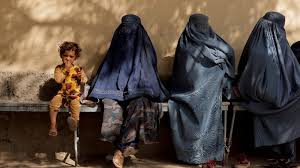In a disturbing escalation of gender-based restrictions in Afghanistan, the Taliban regime has imposed a new ban preventing women from “hearing voices” of other women, marking yet another assault on fundamental human rights. The announcement came through a voice message from Khalid Hanafi, the country’s minister for the promotion of virtue and prevention of vice, highlighting the regime’s continued push toward increasingly extreme interpretations of Islamic law.
Latest Restrictions on Women’s Basic Rights
The Taliban’s latest edict, delivered via an audio recording due to the regime’s ban on showing living beings on television, has left many questions about its precise implementation. The minister’s rambling message included the peculiar specification that “even when an adult female prays and another female passes by, she must not pray loudly enough for them to hear.” This restriction extends beyond prayer, effectively creating a barrier to basic communication between women in public spaces.
The Impact of Hearing Voices Ban on Daily Life
The practical implications of this ban are far-reaching and deeply concerning. Afghan women, already struggling under numerous other restrictions, now face additional challenges in performing basic daily tasks. The ban raises serious questions about how women can function in society if they cannot communicate with each other. For those who are sole providers for their families, the restriction creates nearly impossible barriers to accessing essential services, purchasing necessities, or seeking medical care.
Internal Discord and International Response
The extreme nature of these new restrictions has not only sparked outrage among Afghan women but has also created divisions within the Taliban’s own ranks. A senior Taliban official, speaking anonymously, expressed serious concerns about the direction of the regime’s policies. The official warned that such extreme measures could potentially lead to the Taliban losing control of Afghanistan as quickly as they gained it, suggesting that popular revolt and Western intervention could become real possibilities if the situation continues to deteriorate.
The human toll of these restrictions is becoming increasingly evident. Women across Afghanistan have shared their experiences of depression and despair. In Kabul, one former civil servant described the situation as “incredibly painful,” noting that Afghanistan has been forgotten by the international community. Another woman in Herat province revealed the devastating impact on mental health, stating that many women are “taking their lives due to the pressure.”
These new restrictions add to an already extensive list of limitations imposed on women since the Taliban’s return to power in August 2021. Women are required to cover their faces “to avoid temptation,” must be accompanied by male guardians when leaving their homes, and are forbidden from working outside the home or attending school and university. Even within their own homes, women have been ordered not to speak loudly to prevent their voices from being heard outside.
The UN has raised serious concerns about the ministry for promoting virtue and preventing vice, noting in a July 2024 report that it contributes to a climate of fear and intimidation. The Taliban’s enforcement methods and edicts have created an atmosphere of constant surveillance and oppression, with women facing arrest and imprisonment for defying these rules.
The international community’s relative silence on these developments has not gone unnoticed by Afghan women. Many feel abandoned by Western governments, viewing their current situation as a direct result of international policy decisions. The lack of effective international response has left Afghan women feeling increasingly isolated and vulnerable to further restrictions.
Within the Taliban itself, moderate members are expressing growing concern about the supreme leader’s hardline approach. These internal divisions suggest a potential breaking point, with some officials worried that the extreme nature of these restrictions could ultimately threaten the Taliban’s hold on power. The fear of popular uprising and potential Western intervention looms large in these internal discussions.
The Future Impact of Voice Restrictions
The implementation of the “hearing voices” ban represents a significant escalation in the Taliban’s systematic suppression of women’s rights. As the situation continues to evolve, the international community faces mounting pressure to respond to these unprecedented restrictions on basic human interaction. The ban not only affects women’s ability to communicate but threatens to completely isolate them from society, marking a dangerous new chapter in Afghanistan’s ongoing human rights crisis.
The Taliban’s ban on hearing voices between women represents an unprecedented level of control over basic human interaction, raising serious concerns about the future of women’s rights in Afghanistan. As the international community grapples with this latest development, the need for effective intervention becomes increasingly urgent to prevent further erosion of fundamental human rights in the region.
















